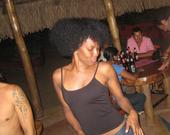I n 1989, former Knights of the Ku Klux Klan Leader David Duke campaigned for the Louisiana House of Representatives. The New Orleans Times-Picayune chronicled this race by carrying Duke's face and history on its front pages -- for what seemed like everyday. I was 12 and amazed, intrigued that such a controversial person sought public office. But I was impressed more with the articles I read about Duke, clipping several of them out of my parent's home-delivered newspaper.
For a social studies fair in elementary school, I chose Duke as my subject -- I really did not have a premise or thesis. I just assumed that the popular public sentiment was not in favor of Duke's run.
I video taped interviews with my classmates at Audubon Montessori, the only public Montessori elementary and middle school in New Orleans at that time with about 95 percent white and 5 percent minority students.
"How do you feel about David Duke? Would you vote for him if you could?", I asked my schoolmates. Duke received no words of support from the sixth and seventh graders. Then I interviewed Duke via phone -- by looking up his name in the city residential listings, I obtained his home phone number and called him on a whim without prepared questions, relying on previously read material for my inquiries.
This was my first experience with reporting and using live, physical sources and not stored encyclopedia or magazine articles for my work.
Although I excelled with research papers in high school -- usually increasing my overall subject grade by a letter by performing well on these papers and using a myriad of scholarly journal sources -- I always thought I would become the next Toni Morrison or Zora Neale Hurston by writing profound, thought provoking novels. But after writing only seven pages in a marble composition notebook for what was suppose to turn into a manuscript later, I decided to try reporting instead.
"I speak well. I could be better than Oprah," I thought, familiar with her background as a TV reporter.
Newspapers were the way to go to broadcast news, I believed, not having a single journalism class. A foundation in print journalism seemed like a logical progression to TV reporting. But after seeing my written words affect people, then learning of the (show) business involved in broadcast, the glamour of TV journalism wore off and I was in love with print media.
